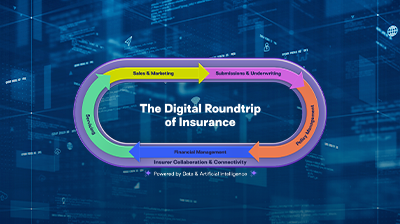Do you see Artificial Intelligence (AI) as a trick lurking in the shadows or as a treat packed with endless possibilities for the industry? We heard from our Voice of Market survey that some in the insurance sector are a little eerie about AI technologies. From optimizing marketing campaigns to improving risk assessment and streamlining claims processing, AI is reimagining how agencies operate, making them faster, smarter, and more effective.
That said, we know there may be worries about cost, complexity and the unknown when it comes to AI. At Applied Systems, we’re ready to help you banish uncertainty and unlock the opportunities that AI places at your fingertips. Let's take a look at some myths around AI in the insurance industry and the security measures Applied System employs in our AI products.
Myths About AI in the Insurance Industry
Myth: AI is going to replace humans and take away jobs.
Fact: This is a common concern among all sectors, not just the insurance industry. Experts don't believe that AI adoption will lead to considerable job loss. The International Labour Organization assessed the impact of Generative AI on job quantity and quality and found that it's more likely to augment jobs rather than destroy them. AI handles the repetitive, time-consuming tasks, allowing agents to focus on fostering better client relationships and more strategic decision-making.
AI automation can be used for historically manual tasks such as scanning datasets, writing emails, and scheduling social media posts. But it doesn't solidify partnerships, develop a new business strategy, or strengthen risk management strategies. Plus, it's the humans who make the customer experience memorable, not the AI-driven technology.
Myth: AI in insurance is unregulated and risky.
Fact: Although many advances have been made with AI, it can still feel like the technology is a free-for-all, but that's not the case. While countries have different rules and regulations around AI, states in the U.S. are beginning to enact their own AI laws. California has enacted several AI-related bills that revolve around transparency, privacy, and government accountability. The Federal Communications Commission is regulating AI-generated voices in robocalls.
Both the National Association of Insurance Commissioners (NAIC) in the U.S. and the EU AI Act outline requirements for transparency, auditability, and human oversight for AI-driven tech. More regulations are sure to come as AI systems grow, but some rules and guidelines are already in place.
Myth: Using AI means doing a huge overhaul of your systems and workflows.
Fact: There's a reason why we say AI tools are a game-changer for insurance agencies. However, AI technologies shouldn't make your workflows and business unrecognizable. Most AI applications are software as a service (SaaS) and don't require you to download an app. The integration isn't as involved and technically difficult as you may think.
You can work with representatives from the AI tool’s company to make this a smooth transition, so you don't have to implement these new technologies alone. Gather a list of questions and make sure you're knowledgeable about the potential risks, how to optimize the tech, and its impact on your workflows.
Myth: AI puts customer data and privacy at risk.
Fact: Cybersecurity has always been a top priority, even before all the advances with AI. Potential risks come in all shapes and forms, whether it's over the phone, by text message, or email. Being in the insurance business means providing financial services with substantial amounts of data. Products can have end-to-end encryption, access controls, and data minimization applied to them. Plus, they can have secure training datasets, which involve multiple layers to protect data. Have you considered that they can provide enhanced security while reducing human error? As AI solutions and tech capabilities expand, so will privacy and security measures.
Safety and Security with Artificial Intelligence
Staying safe and secure in the era of AI is at the top of our minds at Applied Systems. When we build AI for the insurance business, we do so with the intention of being a trustworthy partner to our customers. We create technology that's transparent in its decision-making process, accountable for its actions, and compliant with laws and regulations.
All our technology requires proper security controls to be in place to protect data from unauthorized access. How do we do that? Our AI features can't be deployed unless such security protocols are in place; we minimize data that may be used for AI developed and only collect and use information for legitimate purposes. Our AI products are developed in-house and live in their own, independent environment that we own.
Since we leverage a mix of AI models, like Large Language Models (LLMs) and Large Event Models (LEMs), we provide transparency by labelling any interaction with or content generated by AI. You'll see this with notices that indicate where a summary was created by AI and where other paragraphs of text were edited by a human.
With our AI-powered tech, we keep human beings in the driver's seat over any AI-driven actions. This allows you to evaluate and decide which AI suggestions to keep or delete, so you feel confident in the information and subsequent actions. Never doubt that you'll drive the workflows, control decision-making, and be responsible for the outcomes of your business.
Fears Can Turn Into Opportunities
Change and new technology can be uncomfortable and scary to start, but it doesn't have to stay that way. Your team may be hesitant, worried, or even upset that AI-powered tech is being incorporated into their workplace. So, how do you deal with that? You develop a culture of learning.
We're all learning in real-time with AI. New developments arise, and we all become beginners again. But learning is how we improve and grow. A work culture that encourages and empowers learning transforms fear into opportunity. AI skills are growing in demand, and it provides professionals with the opportunity of upskilling to benefit themselves and streamline their workplaces.
Everyone involved with AI, from Applied Systems to the insurance companies using it can encourage an environment of learning. Do you have questions about the AI in our products? Reach out and let's talk about it. Does it seem like your friends at other companies are all thriving with AI, but you’re still confused? Request a training session or ask your manager questions.
Learning, Understanding and Growing With AI
Fear around AI is understandable, but learning the facts is how we turn fear into excitement. AI-powered technology has the potential to transform agencies and the insurance industry altogether. But we do that by learning more about the tech we're using, and most importantly, how to use it safely. Applied Systems keeps humans in control while providing products that are held accountable, remain transparent, and follow laws and regulations.
Watch demonstrations of our AI-powered products from our webinars, and keep an eye out for future webinars to stay in the loop.
Check out the AI section of our blog to learn how we approach AI and more knowledge on the tech itself.
-

Tanner Randolph
Chief Information Officer and Chief Information Security Officer, Applied Systems
With over 20 years of experience in technology and cybersecurity, Tanner Randolph is a builder and transformer of organizations across multiple verticals, from large SaaS companies to Fortune 50 enterprises. As the Chief Information Officer and Chief Information Security Officer at Applied Systems, Tanner leads the global information technology and security functions, enabling Applied to deliver secure, cutting-edge solutions. Outside of Applied Tanner is also an active advisor within the cybersecurity and AI ecosystems, collaborating with startups, venture capitalists, and industry experts.


